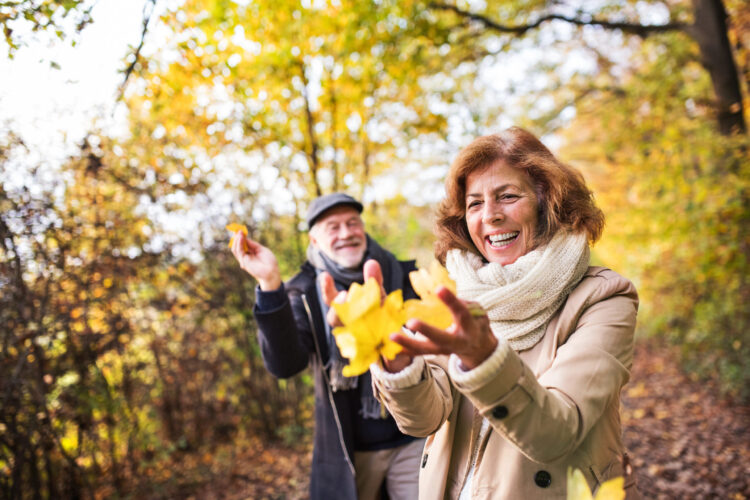
While Ireland and other countries continue to dip in and out of restrictions we are continually being asked of ways to maintain good physical and mental health despite restrictions. We know from research such as the Irish Longitudinal Study on Ageing (TILDA) that loneliness has a mortality comparable to that of smoking1. Long periods of isolation have already impacted many people’s mental health and will continue to do so. So what can we do to mind ourselves over the winter months?
Our favourite coffee shops and restaurants might be out of bounds, but there is plenty of outdoor space to discover on our doorsteps. Ireland is a treasure trove of hills, swim spots, and parks! Concurrently there has been an emergence of research that has been exploring the psychological benefits of connecting to nature. For example, if you find yourself with a mental health issue while living in Japan, the chances are the doctor will refer you to the local forest for some “forest bathing”. There is a well-documented evidence base for using nature as a therapeutic agent with real and measurable psychological and physiological benefits i.e., lower cortisol levels, decreased stress levels, and improved recovery. We now see this play out in reality with planned green spaces now included in rehabilitation facilities, hospitals, and care homes. It may sound a bit woolly, but there is a hard evidence base for these green spaces. Cities with well-planned green spaces are measurably happier!
Modern medicine is still catching up with the evidence of the benefits of structured supported and sustained contact with nature (it may be a while before you are prescribed a few hours in the forest) but there is nothing to stop you from taking in mother nature which can be found 5km from all of our front doors. Activities might include walks, foraging, looking at and identifying flora and fauna, craft with natural objects, gardening and outdoor mindfulness (looking at the clouds, sunset, or stars). Such activities have more than evidence of psychological benefits but also a deepening of social connectedness and increased community reliance. Time spent in nature also has preventative qualities, by helping to maintain a sense of wellbeing, happiness, and belonging.

shrunk to a 5km radius, within that circle we can easily talk to friends and family all over the world. Talking to loved ones about each other’s lives can be the perfect tonic to the perpetual news cycle, with its habit of catastrophising, or the onslaught of online fake news. Click-bait social media stories often lead us to feeling more anxious compared to conversations with real people about our real lives. As Maureen Lipman stated in her famous BT advertisements; “Its Good To Talk”.
Daily exercise has been shown to lower anxiety, improve mood and has a number of proven physical health benefits. Also, preparing meals from scratch is an excellent form of occupational therapy. Whilst dicing and chopping vegetables, our subconscious has a habit of breaking down and rationalising our anxieties giving us something the news often misses; perspective. Beyond meal preparation, food that are high in fibre (think vegetables, beans, greens, nuts and seeds) are the perfect food for our microbiome, which in turn feeds us lots of goodies that have been shown to elevate our mood and protect our health. Did you know that the majority of the serotonin that we make (the happy hormone) is made in the gut?
Chris Tarrant is well known for his stint in the host seat of Who Wants To Be A Millionaire saying “why don’t you phone a friend?”. It is an Irish of traits when asked how we are doing to automatically reply “sure I’m grand”. This might get us out of a jam in the middle of a conversation on the street, but there can be an emotional toll to consistently denying to yourself and others how you are truly feeling. By not accepting that there is inherent pain with life events, such as restrictions, we can indirectly feel shame for individualising these feelings, when in truth most of us are suffering in some manner. We all have good days and bad days, but wearing a good-day mask all of the time can be emotionally exhausting and often we don’t ask for help until we have completely run out of energy. Putting a name to your feelings actualises them and allows you to start planning what you might need to do next and progresses our mood cycle along nicely. Did you know that smokers have a significantly increased chance of stopping smoking if they use the smokers hotline? What are the magical words on the other end of the phoneline? The magic is in fact inside your own mind once you lift the phone and dial the numbers. Just by asking for help you activate different neural circuitry that is more positive and starts the healing process before a word is said. This is also true for mental health issues, once you ask for help you are far more likely to have a positive outcome. So go ahead and phone that friend.
Other tips that might help are to set a list of achievable goals and tick something off each day, perhaps alongside a daily routine. Our do-to lists can seem like an endless penrose stairwell that only ever gets longer, so ticking off the bits and bobs that you have achieved can be very satisfying. These to-do lists don’t have to be a series of life-long goals, rather a set of achievable and realistic tasks that would make a meaningful difference to your life, no matter how small. These minor victories can bring a much needed sense of accomplishment that reinforce the positive neuronal circuitry discussed earlier.
Finally, as the run-up to Christmas will be very different this year, it is OK not to be OK. However if this is the case the best thing to do is to lift the phone and ask for a friendly word with your loved ones, friends or healthcare professional.